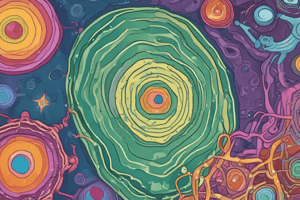Podcast
Questions and Answers
Which of these options are correct? (Select all that apply)
Which of these options are correct? (Select all that apply)
- Protozoa are multicellular organisms.
- Fungi play roles in decomposition and nutrient cycling. (correct)
- Viruses are non-cellular entities that require a host cell to replicate. (correct)
- Bacteria are eukaryotic organisms.
What is the primary process by which plants convert light energy into chemical energy?
What is the primary process by which plants convert light energy into chemical energy?
- Transpiration
- Photosynthesis (correct)
- Fermentation
- Respiration
Which of these is NOT a component of plant biology?
Which of these is NOT a component of plant biology?
- Animal physiology (correct)
- Plant reproduction
- Plant morphology
- Plant physiology
Which of the following is NOT a characteristic of animal biology?
Which of the following is NOT a characteristic of animal biology?
Which of these is NOT a primary factor contributing to habitat loss and species extinction?
Which of these is NOT a primary factor contributing to habitat loss and species extinction?
What is the fundamental unit of life?
What is the fundamental unit of life?
Which type of cell lacks a nucleus and membrane-bound organelles?
Which type of cell lacks a nucleus and membrane-bound organelles?
What is the role of DNA in genetics?
What is the role of DNA in genetics?
What is the process by which species change over time called?
What is the process by which species change over time called?
What is the key mechanism of evolution that favors organisms better suited to their environment?
What is the key mechanism of evolution that favors organisms better suited to their environment?
What is the study of interactions between organisms and their environment called?
What is the study of interactions between organisms and their environment called?
What are the living components of an ecosystem called?
What are the living components of an ecosystem called?
Which of these is NOT a subdiscipline of biology?
Which of these is NOT a subdiscipline of biology?
Flashcards
Biology
Biology
The scientific study of life, encompassing structure, function, growth, evolution, and distribution of living organisms.
Cell
Cell
The fundamental unit of life, exhibiting high organization with various organelles.
Prokaryotic Cells
Prokaryotic Cells
Cells that lack a nucleus and membrane-bound organelles, examples include bacteria and archaea.
Eukaryotic Cells
Eukaryotic Cells
Signup and view all the flashcards
Genes
Genes
Signup and view all the flashcards
Natural Selection
Natural Selection
Signup and view all the flashcards
Ecology
Ecology
Signup and view all the flashcards
Biodiversity
Biodiversity
Signup and view all the flashcards
Microbiology
Microbiology
Signup and view all the flashcards
Bacteria
Bacteria
Signup and view all the flashcards
Plant photosynthesis
Plant photosynthesis
Signup and view all the flashcards
Animal physiology
Animal physiology
Signup and view all the flashcards
Protozoa
Protozoa
Signup and view all the flashcards
Study Notes
Introduction to Biology
- Biology is the scientific study of life, encompassing the structure, function, growth, origin, evolution, and distribution of living organisms.
- It's a broad field encompassing subdisciplines like botany, zoology, microbiology, and ecology.
- Biological principles are applicable in medicine, agriculture, and environmental science.
- Biology integrates knowledge from chemistry, physics, and mathematics.
Cellular Biology
- The cell is the fundamental unit of life.
- Cells are highly organized with organelles performing specific functions.
- Prokaryotic cells (bacteria and archaea) lack a nucleus and membrane-bound organelles.
- Eukaryotic cells (plants, animals, fungi, and protists) have a nucleus and complex membrane-bound organelles.
- Cell membranes regulate the passage of substances.
- Cellular processes like respiration, photosynthesis, and protein synthesis are vital for life.
Genetics
- Genetics studies heredity and variations in inherited traits.
- Genes are DNA segments that code for proteins.
- DNA is a double-stranded helix carrying genetic information.
- RNA plays a role in protein synthesis.
- Mutations change the genetic code, leading to variations.
- Mendelian genetics describes inheritance patterns based on dominance, recessiveness, and segregation.
Evolution
- Evolution is the process of species change over time.
- Natural selection is a key evolutionary mechanism where organisms better suited to their environment thrive and reproduce.
- Adaptations enhance survival and reproduction in specific environments.
- The fossil record supports the gradual evolution of life forms.
- Common ancestry connects different species through shared evolutionary history.
Ecology
- Ecology studies the interactions between organisms and their environment.
- Ecosystems consist of biotic (living) and abiotic (non-living) components.
- Food webs show energy flow and relationships in ecosystems.
- Biodiversity is the variety of life in a region or ecosystem.
- Human activities impact ecosystems, causing habitat loss and extinction.
Microbiology
- Microbiology studies microscopic organisms like bacteria, viruses, fungi, and protozoa.
- Bacteria, prokaryotic single-celled organisms, play crucial roles in ecosystems (e.g., nutrient cycling, decomposition).
- Viruses are non-cellular entities needing a host cell to replicate.
- Fungi are eukaryotic organisms involved in decomposition and nutrient cycling.
- Protozoa, single-celled eukaryotes, can be free-living or parasitic.
Plant Biology
- Plant biology studies plants, including their structure, function, reproduction, and evolution.
- Plants are producers, converting light energy to chemical energy through photosynthesis.
- Plant morphology describes plant structure.
- Plant physiology examines internal processes (e.g., water transport, nutrient absorption).
- Plant reproduction includes sexual and asexual methods.
Animal Biology
- Animal biology studies animal structure, function, development, evolution, and behavior.
- Animal diversity encompasses vertebrates (with backbones) and invertebrates (without backbones).
- Animal physiology explores internal processes and adaptations.
- Animal behavior (ethology) studies animal interactions with their environment and each other.
- Animal evolution traces the evolutionary history and relationships among animals.
Studying That Suits You
Use AI to generate personalized quizzes and flashcards to suit your learning preferences.




